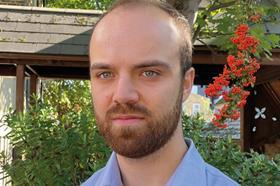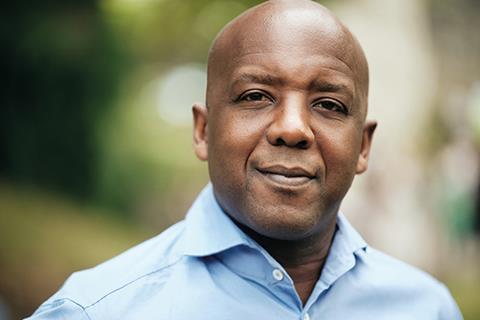Simeon Hance speaks to Trevor Sterling, who recently became the first Black senior partner at a top-100 firm, about his journey into the law and what firms can do to tackle challenges around diversity

Trevor Sterling is a senior partner at a top 100 law firm. He is the first Black solicitor to reach this position at a top law firm in England and Wales. He has gone to the House of Lords and won. He has made history on more than one occasion, and yet across his career, many law firms still would not have offered him a job. Why? Because he hasn’t got a degree.
Many lawyers in his position have got to where they are due to their desire to “climb the ladder” of the legal profession, but for Trevor his motivation is to “be the ladder”. He wants other people with his background to have an easier journey to the top.
Early life
Trevor didn’t grow up with ambitions to become a lawyer. His parents immigrated to the UK from Jamaica, as part of the Windrush generation, and his father worked as a carpenter while his mother in the service industry – both had left school by the time they were 13. When Trevor left school at 16, with no job lined up and no thought of further education, he could never have imagined ending up where he is today.
“I had a meeting with my school’s career adviser, who gave me three options. I could work stringing tennis rackets; I could work at a warehouse; or I could work as a post clerk at a law firm. Purely by chance, I went with the last, and started working at a law firm on October 22, 1984.”
Life in the law
Trevor’s job as an outdoor clerk involved reading and sorting incoming letters and delivering legal papers, but he soon found himself inspired by what the lawyers did. “I’d see these lawyers being reached out to, when other people were in need and needed solutions, and the lawyers were able to solve their issues and make a positive impact on their situation.” The more he saw, the more he wanted to become a lawyer himself, to be able to help those during difficult times. Trevor started expanding his role at the firm, sitting in on interviews and shadowing, to get a feel for what life as a lawyer was like. After doing this for around two years, Trevor decided he wanted to qualify to become a lawyer himself.

At 19, Trevor started studying to become a legal executive, combining working half days with taking correspondence courses. As soon as he began studying, he knew this was something he wanted to commit to. “I realised that the law affects everybody in some way. And so I thought, if I could develop some level of mastery of the law, I’d be able to help so many people.” Trevor took yearly exams until he qualified as a legal executive, before doing additional diplomas through the Institute of Legal Executives. This qualified Trevor to do the Law Society finals (since replaced by the legal practice course), and Trevor’s firm at the time sponsored him, and granted him a year off work, so he could take those exams. He passed the exams, and qualified as a solicitor at the age of 25.
Just three years after qualifying, at age 28, he became both the youngest and the first Black partner at his firm. From there, Trevor has had what he describes as a “journey of non-expectation”. Going from never considering becoming a lawyer, and never seeing lawyers who were Black, to being the youngest partner at his firm, Trevor had already achieved much more than he had expected. This became a self-fulfilling prophecy for him – the more he did, the more he believed he could do. This determination is what led to him becoming the first Black senior partner of a top 100 law firm, at his current firm Moore Barlow.
Throughout his career, Trevor has worked on some remarkable cases. He worked on a landmark employers’ liability suicide case, where – for the first time since 1957 – the suicide arose following an accident for which the employer was found to be responsible. The High Court ruled that the employer was not responsible for the death. Trevor appealed and fought against this judgment, until eventually the case was heard in the House of Lords. Here, Trevor won, and the employer was deemed responsible for the death.
This experience was very personally challenging for Trevor. The victim had been to see Trevor the day before he died; unbeknown to Trevor, he had already decided upon taking his own life. Trevor was also the person who the emergency services got in touch with after the victim was found the following day. “It taught me a lot about being stoic, and about being resilient.”
Diversity
While Trevor has made history in his career, he describes how he is “sad in some ways” that it took until 2021 for there to be a Black senior partner at a top firm. There has been progress when it comes to diversity in the law – Trevor notes how “it’s fantastic to have a Black president of the Law Society” – but there is still a long way to go. “While it’s been rewarding to see, in my firm at least, that it is possible to make history and become the first Black senior partner, we’ve now got to have our second, third, fourth and so on, senior partners from Black or other ethnic groups. It’s then I’ll start to feel that this is a profession that’s really come on somewhat.”
What’s just as important to focus on, Trevor emphasises, is not only race, but also social mobility. Certain groups can be boxed into specific categories, and face certain boundaries, due to prejudices, or coming from a less advantaged socio-economic background. As much as anything, Trevor wants to remove those boundaries, so that “people of all kinds of class and backgrounds can all have the same opportunities, and the same freedom to be their authentic selves.”
The legal profession can still require applicants to have Russell Group university degrees. Applicants from lower income background – who may come from areas with fewer good schools, and whose parents may not have been to university – are much less likely to attend any university, let alone a Russell Group one. While this is a problem that goes beyond the legal profession, it is still very relevant. Trevor states how the legal profession “has a tendency to default to looking at academics as the key factor on who would make a good lawyer. But what actually makes a good lawyer is often life experience.”
Trevor describes himself as “that kid from Mitcham, who didn’t go to university”. He comes from a working-class background and grew up surrounded by overt racism. And yet he’s here today, as a senior partner at Moore Barlow, having won some of the biggest and highest profile class action cases in the country. It shows that what makes a good lawyer isn’t always all about their education, qualifications, or background, but rather using their experience to help their clients.
There is an optimistic sense from Trevor of “if I can, anyone can.” Having faced the challenges he has, to get to where he is now in his career, the last thing Trevor wants is for other solicitors with his background to experience the same thing. He explains: “People like me, who have been through those struggles, do not want others to go through those struggles too.” Trevor points out that the legal profession is often like a ladder, which is very easy for lawyers (himself included) to become overfocused on climbing– from trainee, to associate, to partner; with all of the steps in between. And yet, when reflecting on his career, Trevor notes that his driving force has been to be able to help as many people as possible. It’s not his title of senior partner that gives him the most pride or sense of gratitude, but rather that he can work as a lawyer.
From this, Trevor aspires to move the focus from “climbing the ladder, to being the ladder”. This could be through helping lift clients up and offering the support they need, or training and mentoring other people to shape them into the best lawyers they can be – especially those who otherwise might not receive such guidance. Trevor also urges aspiring lawyers to reach out to others from their background who have broken through, and to use platforms such as LinkedIn to create a network. “Those who have broken through will want to help, and to share their experience and know-how. And the more of this you can receive, the easier it becomes to break through.”
Into action
There are ongoing conversations across all professions around diversity and inclusion. However, it is crucially important to move beyond mere conversations around these topics and start taking concrete actions to improve diversity. So, what are the first steps that an organisation can take?
As is so often the case, admitting there is a problem is the first step to solving it. “To any firm that says they don’t have a problem [with diversity], I say: look around your firm. Take a look at who are the most senior partners are, and then the level below that, and then across the whole firm. Then ask yourself, is this in any way representative of the wider society you see in your day-to-day life? And if it isn’t, then you have the starting point of ‘OK, perhaps we do in fact have a problem’.”
Having accepted that there is a problem, it is much easier to nail down the specifics of what that problem is. Firstly, Trevor suggests asking your staff what’s going on. Get the most authentic and genuine responses from all staff at all levels to see what they truly think, through tools such as anonymous surveys, or bringing in an external consultant. Once this intelligence is gathered, you can come up with a game plan to make sure that “diversity and inclusion becomes part of the rhythm of the business.”
This isn’t enough though – it is crucial that this data is formulated into measurable outputs that can be referred to and checked against, to make sure your firm is on track, and so that once the information is gathered, it is properly used.
Change the culture
One issue that the legal profession faces is that a lack of diversity, breeds a lack of diversity. In general, people tend to be instinctively more drawn to others who are similar to themselves. Trevor points out that this can lead to distinct difficulties in recruitment for law applicants from a different social group: “Imagine there is a group of partners interviewing applicants for a role, and all the partners went to one particular Russell Group university, and then one of the applicants also went to the same university. They’ve now got a huge advantage in the interview over someone who perhaps didn’t go to university at all.” To fix this, firms can use a diverse recruitment panel – but to do that requires the firm to already be diverse!
So what can firms do to encourage a diverse workforce? “Go to work fairs at schools – not just the ‘great’ schools but in other areas too – and be seen, to give younger people [from less advantaged backgrounds] the belief that they can enter the legal profession in the first place… then look at how we can offer apprenticeships and work schemes, to provide real experience to those from socially disadvantaged backgrounds of what it is like to become a lawyer. Then work more closely with universities and other institutions, [to create pathways] to bring more people in to the profession.” To encourage diversity within the legal profession, it is crucial to have diversity within the ways people can enter the legal profession.
Within firms, as well as having measurable diversity goals, it is key to have a culture that is welcoming to a range of people. Create a culture that allows for individuals to be their authentic selves, create a committee for diversity and inclusion, and check that what you’re currently doing isn’t excluding part of your firm. “It’s not good enough to have a culture where you’re having meetings in the pub, after 5pm, excluding a whole group of people.”
This in turn can have benefits for your firm, especially with the current issues around recruitment and retention. Trevor said that his firm has had a noticeable increase in applicants from ethnic backgrounds. For these applicants, seeing a firm that has diversity within its senior partners is a big selling point, as it shows a clear commitment to diversity. And if, once an employee joins a company, they find a culture that accepts their authentic self, it is much easier to retain them. Trevor said “I spent the first half of my career self-conscious of the fact that I was Black, and the second half celebrating that fact.” With individuals like Trevor paving the way, hopefully this celebration of diversity can be seen in firms across the whole industry.
















